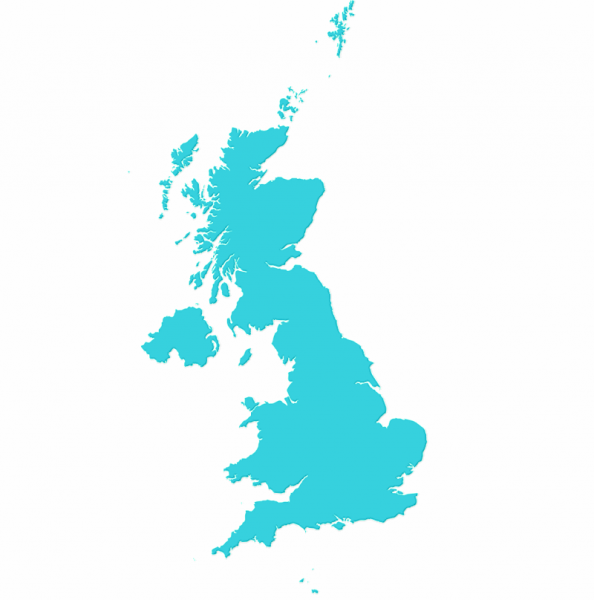2024 H1 – UK Gigabit Broadband Coverage Tops 83 Percent

ISPreview’s latest biannual UK summary of fixed broadband coverage for H1 2024 has found that “full fibre” (FTTP) ISP networks have grown to reach 67.68% of premises (up from 60.54% in H2 2023) and 83.39% are within reach of “gigabit” speeds (up from 79.86%). Continue on to see details for England, Wales, Scotland and N.Ireland.
Practically all the new gigabit-capable (1000Mbps+ or 1Gbps+) class connectivity added during 2024 so far have come from Fibre-to-the-Premises (FTTP) based network deployments via Openreach (BT), Nexfibre (Virgin Media), Hyperoptic, CityFibre, Netomnia (YouFibre), KCOM, Gigaclear and many other operators (Summary of Full Fibre Builds).
The reason why gigabit cover is currently still higher than FTTP is down to the 14.3 million premises covered by Virgin Media’s older Hybrid Fibre Coax (HFC) network, which have been upgraded to gigabit-capable DOCSIS 3.1 technology (there’s a lot of FTTP overbuild of this in urban areas). But that project completed in 2021 and thus the focus now is almost entirely on FTTP delivery for most operators.
Advertisement
In addition, most of the progress on gigabit-capable coverage during 2024 is still down to commercial investment in FTTP, often with only a little support from the Government’s various voucher schemes. But the £5bn Project Gigabit scheme and its subsidised rollouts are starting to have an impact on this, albeit focused on the hardest to reach premises (e.g. rural) that typically take longer to cover.
H1 2024 Broadband Coverage Figures
Listed below is the latest independent modelling from Thinkbroadband to early July 2024 (H1 – 2024). We should point out that the figure for ‘Under 10Mbps‘ doesn’t reflect 4G mobile coverage (we’re only looking at fixed broadband), which plays a part in the official USO (see below table) but isn’t included in TBB’s mapping work. Sadly, it’s incredibly difficult to do an accurate model for mobile coverage, especially in terms of a specific performance level.
Fixed Broadband Network Availability H1 – 2024
| Area | 30Mbps+ | Full Fibre | Gigabit | % Under 10Mbps |
| England | 98.24% (98.07%) | 67.41% (60.06%) | 84.15% (80.73%) | 0.59% (0.64%) |
| UK | 98.01% (97.81%) | 67.68% (60.54%) | 83.39% (79.86%) |
0.79% (0.85%) |
| Wales | 97.04% (96.90%) | 67.38% (59.06%) | 73.65% (67.58%) | 1.60% (1.65%) |
| Scotland | 96.31% (95.99%) | 61.33% (54.82%) | 77.64% (73.73%) | 2.09% (2.26%) |
| N.Ireland | 98.29% (97.70%) | 95.19% (94.09%) | 95.73% (94.68%) | 0.98% (1.35%) |
NOTE: It’s very important to remember that Government / political coverage targets, like 85% for gigabit by 2025, reflect a national average, which can of course be better or worse for some areas (e.g. some counties may achieve higher coverage, while others could be well below that).
Take note that each devolved region (Scotland, Wales etc.) may also have its own policy and targets, which all feed into the central UK coverage figure. Furthermore, it’s worth highlighting how much of an impact newer alternative networks (Altnets) are having on all this – excluding coverage by Openreach, KCOM (Hull) and Virgin Media.
Advertisement
Rival Altnets were found to have covered 35.28% of the UK with FTTP by H1 2024 (up from 30.06% in H2 2023). This breaks down as 37.16% in England (up from 31.75%), 14.23% in Wales (up from 10.72%), 29.71% in Scotland (up from 25.26%) and 34.44% in Northern Ireland (up from 29.39%). But the overall coverage improvement from this will be lower due to overbuild between so many networks, particularly in urban areas.
As stated earlier, this data is an estimate and should be taken with a pinch of salt, not least because it won’t always reflect the very latest real-world position. But it’s still one of the best and most up-to-date gauges that we have for checking against official claims (Ofcom’s own data tends to be several months behind that of TBB’s).
Solutions for Slow Broadband Areas
Finally, those still stuck in sub-10Mbps speed areas will, at least for now, be left with little option but to try harnessing the flawed 10Mbps Universal Service Obligation (USO) via BT (UK-wide) or KCOM (Hull-only). Many of those who have pursued the USO say they were offered a mobile broadband (4G or 5G) connection via EE, but those considered delivered under the USO itself usually get full fibre (FTTP) lines.
However, the reality is that some people will find they live in areas where not even the USO can cover the colossal upgrade costs of getting FTTP (here and here). The government are currently still examining support options for remote premises and are also preparing to review the broadband USO (here), which may bring some changes in the future, particularly with the new change in leadership (here).
Advertisement
Failing that, consumers could either try waiting to see if the problem gets resolved or consider exploring the option of a LEO satellite service (Starlink is good, if you can afford it). We would also recommend that consumers check via Three UK, Vodafone and O2 (VMO2) to see if any of those deliver better 4G or 5G mobile coverage than EE in your area (ideally by conducting your own tests, since official coverage maps are fairly useless) – see our guide to external antennas.
Mark is a professional technology writer, IT consultant and computer engineer from Dorset (England), he also founded ISPreview in 1999 and enjoys analysing the latest telecoms and broadband developments. Find me on X (Twitter), Mastodon, Facebook, BlueSky, Threads.net and Linkedin.
« ISP Hey! Broadband Offer 900Mbps Plan at £1.99 Monthly for Six Months





















































Thanks very much. A lovely, informative and detailed description of the current BB UK status on availability.
It’s so vital to have reliable and usable internet access to function and prosper.
We’re rural with 1M adsl fixed available, went 4G years ago but sadly it seems to be getting poorer and poorer. Were assuming its as the commercial forestry between us and the mast grows, I’ve no idea whete we’d stand if it becomes unusable, USO but 4G wont be an option , and the deployment costs for our area have ruled us out of all government and commercial schemes, currently its looking like starlink is going to be our only choice in the foreseeable future
why not try Starlink? can be good option
I’m not 100% sure why, but from the same mast I used to get 40+ meg but that’s slowly dropped to suspiciously close to the 10-15meg area (USO gaming the system?). Could just be as new mobile broadbands expanded in the rural area of mid Wales though
We are in the frustrating situation of being in a fairly rural location where Openreach FTTP has been rolled out, but they just stopped building at the end of our road. We get <1mb/s with the current copper line and have tried reaching out to numerous people (i.e. Clive Selley, our MP, etc) but Openreach just continually refuse to build down our road.
We are using Starlink now which is a lifesaver, and we are in Gigaclear's plans for 2025, but it really is a shame we were just abandoned by Openreach.
You were not abandoned, it just wasn’t included in the project, it may have involved closing a road, needed substantial civils or the cost per prem was too high so wasn’t financially viable to do at the time. (May need some additional government funding or a voucher scheme)
How far is the closest property that can order full fibre?
Brsk went live in my area but not openreach. I’m not sure if openreach have done the work yet but I’m assuming they would do it at the same time as brsk – brsk use existing openreach ducts and telegraph poles.
When I contacted openreach before brsk even installed they said it should be live in March when I contacted them after brsk installed they’ve now said 2026. I’ve just asked them to clarify if it was installed alongside brsk as that would have made the most sense.